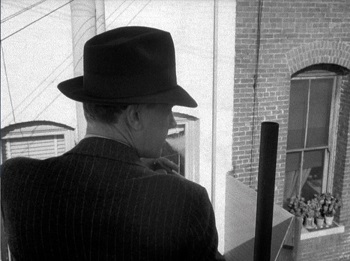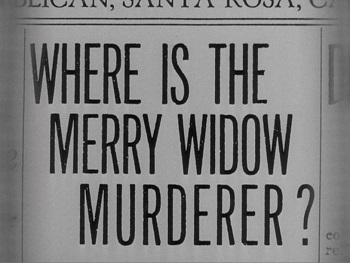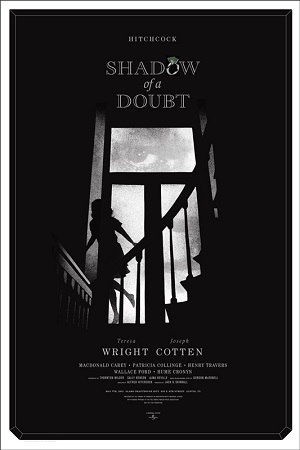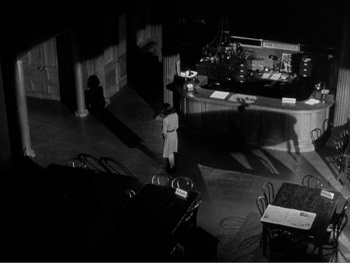"...You're just an ordinary little girl living in an ordinary little town. You wake up every morning in your life and you know perfectly well there's nothing in the world to trouble you. You go through your ordinary little day and at night you sleep your untroubled ordinary little sleep filled with peaceful, stupid dreams. And I brought you nightmares."
 Shadow of a Doubt is considered the personal favorite of the master director and is also one of his highest regarded films and it makes sense. While his detective and murder stories have been regarded for their unconventional and unique characters and settings, Shadow of a Doubt is perhaps his most unconventional and unique of them all.
Shadow of a Doubt is considered the personal favorite of the master director and is also one of his highest regarded films and it makes sense. While his detective and murder stories have been regarded for their unconventional and unique characters and settings, Shadow of a Doubt is perhaps his most unconventional and unique of them all.
In the role of detective we have a harmless young and naive girl and in the role of the villain we have a charming man who is anything but unlikable: a man whom that girl admires more than anyone and anything else in her life. Charlie is a charming, handsome man whose company is enjoyed by everyone he crosses paths with. His relationship with his sister is close and she thinks so highly of her brother that she named her daughter after him and her daughter in turn loves her uncle so much that she considers him a kindred spirit, and perhaps the real tragedy behind Shadow of a Doubt is that she isn't wrong.
From the beginning, Hitchcock sets up Uncle Charlie as more secretive than deceptive. He clearly has done something wrong and is on the run, but it doesn't become clear until the young and intuitive niece is left with no other option but to look into and realize the unnerving truth her esteemed uncle is keeping from her and the rest of the world. When Young Charlie makes this revelation, the scene is directed and acted so well that the viewer can almost feel the same emotions that are running through the mind of a girl who has had her world come crashing down in flames. I do believe that the uncle and niece are kindred spirits and Young Charlie makes this obvious in her opening scene, where she states to her father her misanthropy stemmed from the hopelessness and banality of the only world she knows and how it has infected her own family. The irony is that this is the hero of our story and she unknowingly is setting the tone to the dark philosophy of our villain.
When Young Charlie makes this revelation, the scene is directed and acted so well that the viewer can almost feel the same emotions that are running through the mind of a girl who has had her world come crashing down in flames. I do believe that the uncle and niece are kindred spirits and Young Charlie makes this obvious in her opening scene, where she states to her father her misanthropy stemmed from the hopelessness and banality of the only world she knows and how it has infected her own family. The irony is that this is the hero of our story and she unknowingly is setting the tone to the dark philosophy of our villain.
Uncle Charlie is another of Hitchcock's greatest and most memorable antagonists. He is also possibly the most charismatic and most deceptive. He has so much charisma that upon both my first and second viewing, I still found myself drawn to him despite his malicious nature and intent. He's the kind of bad guy you hate to love because of his dialogue and most importantly, the performance. This is the film that turned me onto the subtle talent of Joseph Cotten, and while this was my first experience involving the actor, it has since been unmatched. He disappears into the role so well while retaining the personality that has always brought out his colorful demeanor. It's as if he was born to play Uncle Charlie.
What makes Uncle Charlie such a charming presence is all of his qualities, both good and bad. Young Charlie is the kind of character the audience is meant to relate with. While the narrative is told through both characters' perspectives, it is through her that the audience relates most with. Through Young Charlie, the viewer is won over by what makes her uncle so appealing and attractive and the genius of this film lies in how difficult it is for her and the rest of us to accept the harsh reality. He slowly makes the viewer aware of his own misanthropic philosophy and how much he hates the world and sees everyone around him as insects that he can't help but despise. It is in her uncle's disconcerting dialogue where the subtle hints of his view of the world unforgivably comes hurling toward Young Charlie and the audience and it is probably my favorite scene in the whole film. It is an important scene because from that point onward, we see Uncle Charlie in complete contrast to the first half. Where we were once charmed and won over by this larger than life personality has now been replaced by shock and disgust. We have now found our hero of the story and we greatly sympathize with her because of this mountain that now rests on her shoulders. She is in the midst of a terrible dilemma and both she and the viewer are never quite sure what the right decision is that she can make to overcome and pull through this insurmountable affliction she was never prepared for.
Young Charlie is the kind of character the audience is meant to relate with. While the narrative is told through both characters' perspectives, it is through her that the audience relates most with. Through Young Charlie, the viewer is won over by what makes her uncle so appealing and attractive and the genius of this film lies in how difficult it is for her and the rest of us to accept the harsh reality. He slowly makes the viewer aware of his own misanthropic philosophy and how much he hates the world and sees everyone around him as insects that he can't help but despise. It is in her uncle's disconcerting dialogue where the subtle hints of his view of the world unforgivably comes hurling toward Young Charlie and the audience and it is probably my favorite scene in the whole film. It is an important scene because from that point onward, we see Uncle Charlie in complete contrast to the first half. Where we were once charmed and won over by this larger than life personality has now been replaced by shock and disgust. We have now found our hero of the story and we greatly sympathize with her because of this mountain that now rests on her shoulders. She is in the midst of a terrible dilemma and both she and the viewer are never quite sure what the right decision is that she can make to overcome and pull through this insurmountable affliction she was never prepared for.
I've been reflecting back on the sexual subtext within most of the Hitchcock films I've been revisiting and another aspect that stuck out heavily on this rewatch was a particular scene where the uncle and niece are alone in the kitchen together. There is such a heavy and unbridled amount of sexual tension that it almost borders on being romantic. It's an amazing sequence because of that level of balls Hitchcock was known for and also plays into the appeal Charlie has around everyone around him. Because his niece holds him so high, the viewer could believe without being disturbed by the possible sexual attraction she has for him.
 If I have any criticism of the film, it is in the lead detective on the trail of Charlie. I felt that he lacked the required charisma to stand up next to the leads and this makes his tenacity irritating as well as the romantic subplot involving him and Young Charlie, which transitions too fast and I felt it was inserted for the sole purpose of pandering and inspired nothing but eye rolls from me. But that is a small detail that can be dismissed due to everything else that makes this film such a masterpiece, and has since become a heavy influence on future mystery and suspense films. I see a heavy influence on the work of David Lynch, who also had an obvious fixation on small town America, best exhibited in Twin Peaks and Blue Velvet, the latter of which I believe to be one of the most inspired films from Shadow of a Doubt.
If I have any criticism of the film, it is in the lead detective on the trail of Charlie. I felt that he lacked the required charisma to stand up next to the leads and this makes his tenacity irritating as well as the romantic subplot involving him and Young Charlie, which transitions too fast and I felt it was inserted for the sole purpose of pandering and inspired nothing but eye rolls from me. But that is a small detail that can be dismissed due to everything else that makes this film such a masterpiece, and has since become a heavy influence on future mystery and suspense films. I see a heavy influence on the work of David Lynch, who also had an obvious fixation on small town America, best exhibited in Twin Peaks and Blue Velvet, the latter of which I believe to be one of the most inspired films from Shadow of a Doubt.
I wouldn't recommend this as being one of Hitchcock's most accessible but if you are a fan and have yet to see it then you are doing yourself a great disservice. Like his greatest, here is another that will grab you by the throat and stay with you long after the credits.
Please feel free to discuss "Shadow of a Doubt" here, in our forums!

